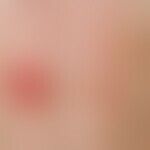DefinitionThis section has been translated automatically.
Controlled provocation of certain dermatoses (see below light dermatoses) by means of UVB-/A-light exposure of circumscribed skin areas with suberythema doses or the MED, for diagnostic purposes
ImplementationThis section has been translated automatically.
A prerequisite for provocative light tests is the prior performance of the light stairs in the UV-A and UV-B range. S.u. MED. This can prevent grossly pathological reactions with damage to the skin. The tests are modified depending on the clinical symptoms (in-loco-irradiation over several days, use of UV spectra suspected to be the trigger, testing in places that do not appear at the time of testing, not accustomed to light, but which are considered reactive as known from anamnestic data! Special procedure: see below Light dermatosis, polymorphic.
ClinicThis section has been translated automatically.
Diagnostic significance for light dermatoses or UV-provocable dermatoses, if the determination of MED-UVB or MED-UVA has yielded normal values ( polymorphic light dermatosis, Hidroa vacciniformia, lupus erythematosus, phototoxic dermatitis etc.) .
LiteratureThis section has been translated automatically.
- Lehmann P et al (1986) Light diagnostic procedures in patients with suspected photodermatoses. CentrBl HuG 152: 667-682
- Sander CJ et al (2003) Photosensitivity in patients with lupus erythematosus: a clinical and photobiological study in 100 patients using a prolonged phototest protocol. Br J Dermatol 149: 131-137






